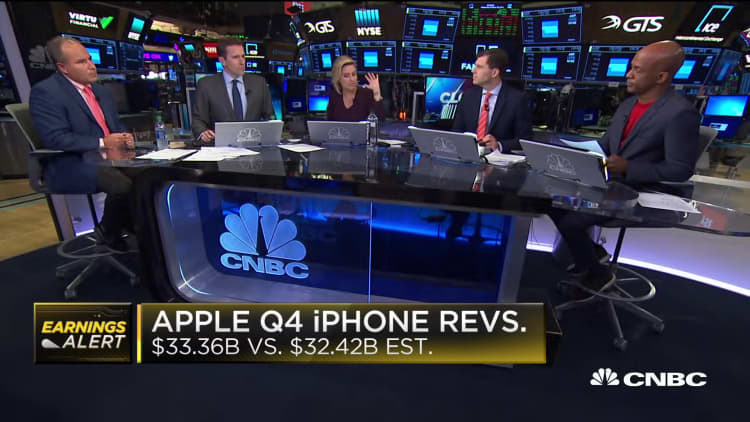
Apple's revenue decline in China is slowing, highlighting signs of stabilization in one of the world's largest smartphone markets, despite the ongoing U.S.-China trade war and the continued growth of Huawei.
However, analysts cautioned that Apple could face some tough quarters ahead without a 5G-capable iPhone on the market as China switches on its next generation, high-speed mobile networks.
Apple reported China net sales of $11.13 billion in its fiscal fourth quarter on Wednesday, a 2.4% year-on-year decline. That fall in percentage terms was smaller than the 4.1% drop recorded in the June quarter and the 21.5% plunge posted in the March quarter.
Amid the U.S.-China trade war, investors have worried that American firms operating in the world's second-largest economy could suffer. China is a crucial market for Apple not just for sales of its products but also the manufacturing of its iPhones. And new tariffs scheduled for December will hit the iPhone, which remains the largest contributor to Apple's overall sales.
The U.S. and China have indicated, however, that they are ready to sign an interim trade agreement.
Apple CEO Tim Cook attributed the improvement in China to a number of factors. He said on a Wednesday earnings call that the "trade tensions is less" and that products have been "extremely well received" in China.
"The things that we've done from a pricing and monthly payments point of view and trade-in — getting the trade-in program up and running — all of these things have had moved the dial," Cook said, referring to the scheme in which customers can trade in an old iPhone for credit toward a new one.
"I would also say, it's not all about iPhone in China. The services area grew double digit. We began to see more gaming approvals in the quarter, or I should say some key gaming approvals. It's not all about quantity, but about which ones. We saw that. Also wearables — wearables are doing so great at a company level. They're doing even better in China. And so lots of positives there," he added.
In China, video games need to be approved by regulators in order to be released and monetized. Early last year, the government froze game approvals but then began to resume green lighting some titles at the back end of 2018. Games are a key part of Apple's service revenue from its App Store.
Apple's services segment, which includes products like iCloud subscriptions, as well as the wearables division, were a big driver in the tech giant's fiscal fourth-quarter earnings beat.
iPhone in China
Apple's revenue from iPhones beat market expectations but still declined around 9% year-on-year for the quarter ended September. The company released its iPhone 11 range in September with an improved camera and processor.
Daniel Ives, managing director of equity research at Wedbush Securities, said that there are a large number of iPhone users waiting to upgrade, which could help Apple grow in China.
"China came in well above our and Street expectations and is on the path to showing growth in the region which remains the focus of investors with this key region representing roughly 20% of all iPhone upgrades over the next 12 to 18 months," Ives said in a note on Wednesday.
Apple's iPhone 11 range accounted for 40% of its shipments in China, according to Canalys. Apple reduced the premium Chinese buyers had to pay versus the U.S. price for the new phones. Nicole Peng, vice president of mobility at Canalys, said that the cheaper iPhone 11 model performed well.
Despite the iPhone 11's performance, overall shipments fell 28% during the quarter, which Peng attributed to consumers not buying older Apple smartphones.
"Even the new device launch cannot offset the drops in the old device," Peng told CNBC, adding that consumers could be holding off for a 5G iPhone, which Apple has not yet released, but could do next year.
"In the next few quarter before 5G iPhones launch, Apple should expect very difficult quarters going forward because the older devices are losing interest."
Earlier this year, Apple was forced to cut the prices of its iPhone XR, iPhone XS and iPhone XS Max in China.
5G refers to next-generation mobile networks which promise super-fast data speeds. Apple's competitors such as Samsung and Huawei have 5G smartphones on the market while China is expected to begin turning on its high-speed networks in the coming months.
Meanwhile, Apple is facing increased competition from Huawei in China. The Chinese technology giant captured a record share of the country's smartphone market in the third quarter, as shipments grew 66% from a year ago, according to Canalys. The overall Chinese smartphone market declined 3%.
Huawei remains on a U.S. blacklist, restricting its access to American technology. That has led to its latest flagship smartphone, the Mate 30, being released in international markets without licensed Google apps. Huawei has stepped up its focus on its domestic market as a result, at the expense of Chinese rivals like Xiaomi but also Apple.
"Right now Huawei is a risk to everyone," Peng said.


